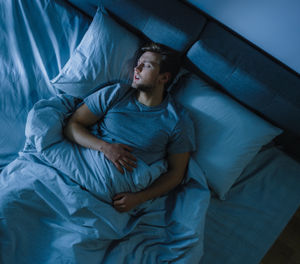Secrets of the dream world: Inside the world of sleep
They can seem almost life-like or make no sense at all but whether you remember them or not, dreams are a normal part of sleep.

And if you think your night-time visions have become more intense in recent weeks, then you are definitely not alone.
Experts believe unusual and vivid dreams and nightmares could be a side effect of the current pandemic as our daytime anxieties cross over into our subconscious as we sleep.
They have discovered the importance of sleep in regulating our metabolism, blood pressure, brain function, and other aspects of health but less is known about the purpose of dreams.
An abundance of different theories about why we dream exist and many believe that these night-time visions have a meaning.
Some scientists say dreams have no purpose or meaning but others believe they are vital for our mental, emotional, and physical health.
What experts do agree on is that dreams can happen at any time during the night but we have our most vivid dreams during a phase called REM,rapid eye movement, sleep, when our brain is most active.
Scientists estimate that we have roughly three to six dreams in one night and around 95 per cent of these dreams are forgotten the following morning.
But if you happen to wake up in the morning during the REM stage of sleep, a dream may seem fresher in your mind. According to one theory, dreams so difficult to remember due to the changes in the brain that occur during sleep do not support the information processing and storage needed for memory formation to take place.
Researchers have found some differences between men and women when it comes to the content of their dreams.
It's also believed that even some of our pets dream as dogs and cats will move their paws during deep periods of sleep and even bark or meow.
At the moment many of us will have experienced changes in our sleep pattern as a result of our daily routines adapting to lockdown.
It may mean that many of us are dreaming more or remembering more of the dreams that we have.
One popular theory is that dreams are the brain’s way of working out through emotional problems and the more that is on our mind, the more vivid they become.
Jamie Moryoussef, from sleep specialist nanu, says: "Dreams are actually a key part of how our brain makes sense of our lives, and the dreams we have are generated for many different reasons; be it to process our day, make sense of something upsetting, or to handle stress and trauma.
"Dreaming acts like a virtual organiser, consolidating all of these issues for us while we’re in the land of nod.
“Most of us will remember few of our dreams and these dreams are rarely likely to impact how we feel once we wake up.
"Sadly, this may not currently be the case as this crisis continues to unfold, and anxieties around health, work, money and the future could be crossing over from our real world into our subconscious while we’re asleep.”
The lockdown is affecting everybody in different ways; some people might easy to nod off as they feel more tired than normal but others may find themselves restless and unable to snooze.
Those struggling to sleep often turn to watching videos on YouTube or TikTok to amuse themselves while everyone is out for the count.
But starring at glowing screens can actually make getting any rest harder to achieve as they keep the brain alert and active.
Instead experts say that if you cannot sleep, it's best not to lie there worrying about it. Get up and do something you find relaxing, such as reading a book or listening to quiet music until you feel sleepy again, then go back to bed.
They also recommend going to bed and getting up at roughly the same time every day as this should programme your body to sleep better. This should be a time when you know you're likely to feel tired and sleepy.
Creating a restful sleeping environment is also important so move any distractions such as a TV or your pet out of the bedroom.
Jamie says establishing a night-time routine is also essential when you’re winding down to hit the hay.
“The run up to bedtime has a major effect on the quality of our sleep: try to destress before your head to bed, cut back on social media browsing ahead of turning in and stick to a routine if you can.
“It’s also advisable to make your bed a real haven. Customised bedding that allows you to cocoon yourself, along with a duvet that’s the right tog so you sleep at your own ideal temperature, can really have an impact on how comfortable a good night’s sleep is," he adds.
Here are 10 of the most common vivid dreams and their possible meanings:
* Teeth falling out suggests worries about personal appearance and/or worries about others’ perceptions
* Being chased may mean a real-life anxiety – or an anxiety about the dreamer’s own personality – is creeping up on them
* Being unable to find a toilet may indicate holding back true feelings about someone or something
* Being naked in public suggests worries about being exposed as a fraud or being wrongly accused of something
* Going into an exam with no preparation reflects a lack of self-belief
* Fear of flying could mean the dreamer is afraid they can’t live up the tough goals they set for themselves
* The feeling of falling usually indicates overwhelming anxiety
*An out of control vehicle may mean the dreamer is worried about a lack of control in where their life is headed
*Finding a brand-new room in a building you know well suggests a new and positive outlook is just around the corner
*Being late suggests the dreamer is worried about time slipping away or that they simply won’t achieve what they need to in the time they have left





